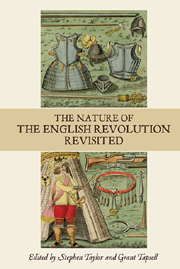Book contents
- Frontmatter
- Contents
- Preface and Acknowledgements
- List of contributors
- List of Abbreviations
- 1 Charles I and Public Opinion on the Eve of the English Civil War
- 2 Rethinking Moderation in the English Revolution: The Case of An Apologeticall Narration
- 3 The Parish and the Poor in the English Revolution
- 4 Body Politics in the English Revolution
- 5 The franchise Debate Revisited: The Levellers and the Army
- 6 Oliver Cromwell and the Instrument of government
- 7 ‘de te fabula narratur’: The Narrative Constitutionalism of James Harrington's Oceana
- 8 Democracy in 1659: Harrington and the Good Old Cause
- 9 The Restoration of the Church of England, 1660–1662: Ordination, Re-ordination and Conformity
- 10 Style, Wit and Religion in Restoration England
- 11 A British Patriarchy? Ecclesiastical Imperialism under the Later Stuarts
- Index
- Studies in Early Modern Cultural, Political and Social History
8 - Democracy in 1659: Harrington and the Good Old Cause
Published online by Cambridge University Press: 05 July 2013
- Frontmatter
- Contents
- Preface and Acknowledgements
- List of contributors
- List of Abbreviations
- 1 Charles I and Public Opinion on the Eve of the English Civil War
- 2 Rethinking Moderation in the English Revolution: The Case of An Apologeticall Narration
- 3 The Parish and the Poor in the English Revolution
- 4 Body Politics in the English Revolution
- 5 The franchise Debate Revisited: The Levellers and the Army
- 6 Oliver Cromwell and the Instrument of government
- 7 ‘de te fabula narratur’: The Narrative Constitutionalism of James Harrington's Oceana
- 8 Democracy in 1659: Harrington and the Good Old Cause
- 9 The Restoration of the Church of England, 1660–1662: Ordination, Re-ordination and Conformity
- 10 Style, Wit and Religion in Restoration England
- 11 A British Patriarchy? Ecclesiastical Imperialism under the Later Stuarts
- Index
- Studies in Early Modern Cultural, Political and Social History
Summary
Between the death of Oliver Cromwell in September 1658 and the return of Charles Stuart as Charles II in May 1660, political reversals and upheavals succeeded each other with astonishing speed. A fresh phase of contestation of the protectorate under Richard Cromwell was ended by the power of the army, as was the restored Rump which followed from May to October 1659. Beyond that point expedients failed and a succession of restorations - first of the Rump and then of the Long Parliament's excluded members - paved the way for the return of the Stuart monarchy. Historians have tended to characterize the republican and constitutional debate of this period as vague, visionary, and nostalgic - nostalgic, indeed, for a republican moment in the early 1650s which had never really existed and was now only hazily imagined. The ‘Good Old Cause’, itself a conveniently loose formulation, stirred impulses which were ‘always more emotional than rational’. The fervent, or desperate, hopes and fears of 1659 were chiliastic, prophetic; the republican debate with which sectarian desires were intertwined has sometimes seemed like a by-product of the same irrational ‘enthusiasm’. Squabbles between the republican thinkers themselves, and among the political constituencies backing some version of the Good Old Cause, have featured prominently in the historiography, adding to the sense of political stalemate and dysfunction, with the various factions acting out the hopeless endgame of the interregnum before an inevitable monarchical restoration.
- Type
- Chapter
- Information
- The Nature of the English Revolution Revisited , pp. 175 - 196Publisher: Boydell & BrewerPrint publication year: 2013



